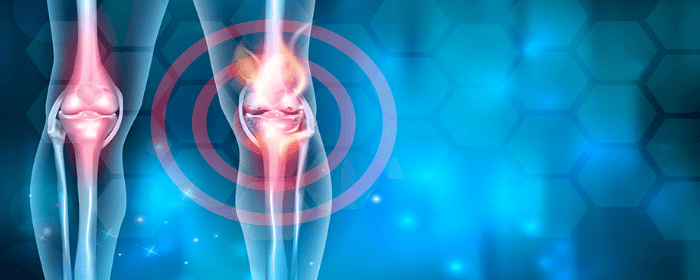Osteoarthritis is the most common form of arthritis. In osteoarthritis, the cartilage of the joints breaks down, bone spurs form, the synovial linings become inflamed, and the ligaments around the joint calcify. All of these pathological changes combine to cause joint pain, swelling, and stiffness. The breakdown of the joint also means that it does not function properly. The arthritic joint may “lock up,” “give out,” or simply not be able to move through its normal range of motion. Early in the disease, the pain of osteoarthritis may be brought on by movement. Later, the pain is more or less constant with severe pain flares.
Initially, the treatment for osteoarthritis is pain medications, exercise, braces, and physical therapy. Joint injections may be helpful for 4 to 6 weeks, but recent research suggests that repeated steroid injections may break down cartilage and speed up joint destruction. Unlike treatments for rheumatoid arthritis, there are no disease-modifying treatments for osteoarthritis. The disease tends to get worse over time until surgery is required. Joint replacement surgery is usually the treatment of last resort.
Since osteoarthritis is a degenerative joint disease, a reasonable approach to therapy is to try to rebuild or regenerate the joint tissues. This would not only stop the disease progression of osteoarthritis but perhaps even heal the damaged joint. For this reason, regenerative medicine, also known as stem cell therapy, is drawing the attention of many scientists who are looking for alternative therapeutic treatments for osteoarthritis.
Researchers tested the ability of mesenchymal stem cells to relieve pain and treat the damage of osteoarthritis. More specifically, they used the exosomes that the mesenchymal stem cells produce. Exosomes are tiny packets of substances like RNA and peptides that support tissue growth and repair. Exosomes contain most of the molecules that make mesenchymal stem cells helpful.
The scientists found that giving exosomes from mesenchymal stem cells to animal subjects with experimental osteoarthritis had some remarkable effects. Not only did the stem cell-derived treatment substantially reduce pain in the rats with osteoarthritis, but microscopic and molecular evidence also showed that the exosomes were able to repair cartilage in the affected joints. This is truly impressive when you consider that other treatments for osteoarthritis only reduce symptoms—they do not repair cartilage or stop the progression of the disease.
While this work will need to be replicated in human clinical studies (and that work has already begun), this is an exciting finding for the millions of Americans who struggle with osteoarthritis.
Reference: He, L., He, T., Xing, J. et al. Bone marrow mesenchymal stem cell-derived exosomes protect cartilage damage and relieve knee osteoarthritis pain in a rat model of osteoarthritis. Stem Cell Res Ther 11, 276 (2020). https://doi.org/10.1186/s13287-020-01781-w


 St. Petersburg, Florida
St. Petersburg, Florida
